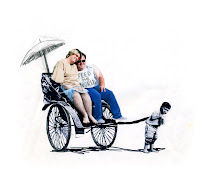Is "Just for Men" serious with this ad? Is there really a strong link between hair turning gray and being fired? Well, apparently they think so. I guess that's the way of the corporate world.
"Will people still see me as a valuable player? Is my career going down?:
This is a superb example of irrational marketing playing on the fears of the consumer. It can only exist in a superficial society like our own where emotions rule over reason. Men probably do equate graying hair with aging, loss of virility, or power, but this thought is not founded. There is no real link between gray hair and any of those possibilities. It just happens to have that social connotation. A correlation is not a cause. But the fact does remain that the thought exists within the minds of men, it's real to them. Maybe it is because emotion is allowed to reign over reason, or maybe there is some other cause, a natural insecurity. Either way, this ad capitalizes on that fear.
The underlying thought here is that man, at his essence, is a rational, emotional animal who must use the former to regulate the latter. They are both equally capable of expressing man's excellence, but emotion must obey reason for the simple fact that it provides some sort of filter on the world. Without reason, emotion rules without purpose. Reason provides direction to emotion. That's the basic thought I'm working from. So, man has this inherent battle. If we take it from birth, it would seem intuitively correct to say that the conflict would exist regardless of any environmental influence. Which way is it leaning at birth? I have no idea. That's probably a genetic issue. Ok. It doesn't really matter though if there are predispositions in either direction. It's either pretty even or skewed. How each of these capacities are nurtured determines the extent to which we move from potential to actual. It's the defining question of our existence. Not determined by some book but revealed simply by looking at the basic capabilities which separate us from the rest of nature. It's our consciousness reflecting on its own cause. I can't think of anything more natural.
Bringing this back to the Just for Men ad, is it in our best interest as a species to provide environmental influences which stack the deck against reason?
But Steve maybe it is true that people will judge your competency based on the color of your hair? In this case, wouldn't it be perfectly appropriate, and even ethical, to impart this message to consumers?
Nice try, and way to divert the conversation to ethics, but it doesn't matter if it is a true reflection of human behavior. All that matters is that the ad plays directly to the emotionally thinking consumer; there is no evidence, only rhetoric. It's not as if there is some strict rule banning gray hair. If this did exist, then the thought process resulting in the decision to use hair coloring would be reasonable and not driven by emotion since it would be grounded in the desired end of keeping one's job.
If there is such widespread discrimination against graying hair maybe we need a special interest group protecting the rights of men with gray, charcoal, and white hair. Better yet, and the facetious part is over, we need a special interest group protecting all of humanity. That would seem to defy the rules governing special interest groups, though. Namely, that the emphasis is on our unified capacity for reason, emotion, self-awareness, and community, but, not focused on the segmentation and splintering of society according to our beliefs or historical and genetic differences.
There is very little questioning today, aside from mostly partisan political discussion. Everything is just accepted as the best possible scenario. We are so goddamned content. We're Rip van Fucking Winkle. Ahhh..the joy of modernity. (Deep exhale of exasperation) I'm very underwhelmed by these "great" things man has done. Yes, I think technological advancement and recreational time are absolutely essential for a successful civilization, and we have some cool toys. And, of course there have been significant strides towards true freedom for every individual. It's this paradigm of Consumerism that has me worried. We love the meaningless.
I've been asking myself some variation of this question for the past few years: Isn't there more to human freedom than the ability to purchase? Or for that matter the disgusting attempts by individuals making others an instrument to their will. It makes me sick the way our freedom is squandered. We are complicit in our obsolescence, but our blame is small. By the time we are able to pick up the pen and start really directing our own lives, there are major blows to perception of the world like middle and high school. It's very difficult for well nurtured children to go through high school and not become affected by their infected classmates. Speaking from personal experience, my view of human nature was completely destroyed. Ruined my life. But you adjust (one of the two facts of life, along with death) with the aid of reason and move on, learning.
We need to maximize everything that promotes learning and minimize anything that injures it. There are enough obstacles as it is. Nature poses the same evolutionary question to us that the Greeks and Romans faced 2,000 years ago: Towards what end is our reason directed? The way we deal with our capacity for rationality determines the ultimate fate of our species. Can we agree on this? Can we at least talk about it a little?

No comments:
Post a Comment